Project: Impact of Leadership Styles on Employee Performance
VerifiedAdded on 2022/05/30
|5
|1501
|391
Project
AI Summary
This project assesses the impact of various leadership styles on employee performance, focusing on both private sectors. It explores the existing research gap concerning the optimal leadership style for different company types and poses several research questions, including how leadership styles enhance employee performance, influence motivation, and shape organizational culture. The project reviews literature, identifies different leadership approaches, and their effects on employee satisfaction and retention. It employs Positivism philosophy and a deductive approach with an explanatory research design, collecting data through mixed methods, including surveys and direct questioning. The project aims to identify the relationship between leadership and employee performance and considers factors affecting leadership skills and strategies of successful leaders. The project emphasizes the importance of leadership styles in improving employee performance and organizational outcomes, providing a foundation for future research in this area.
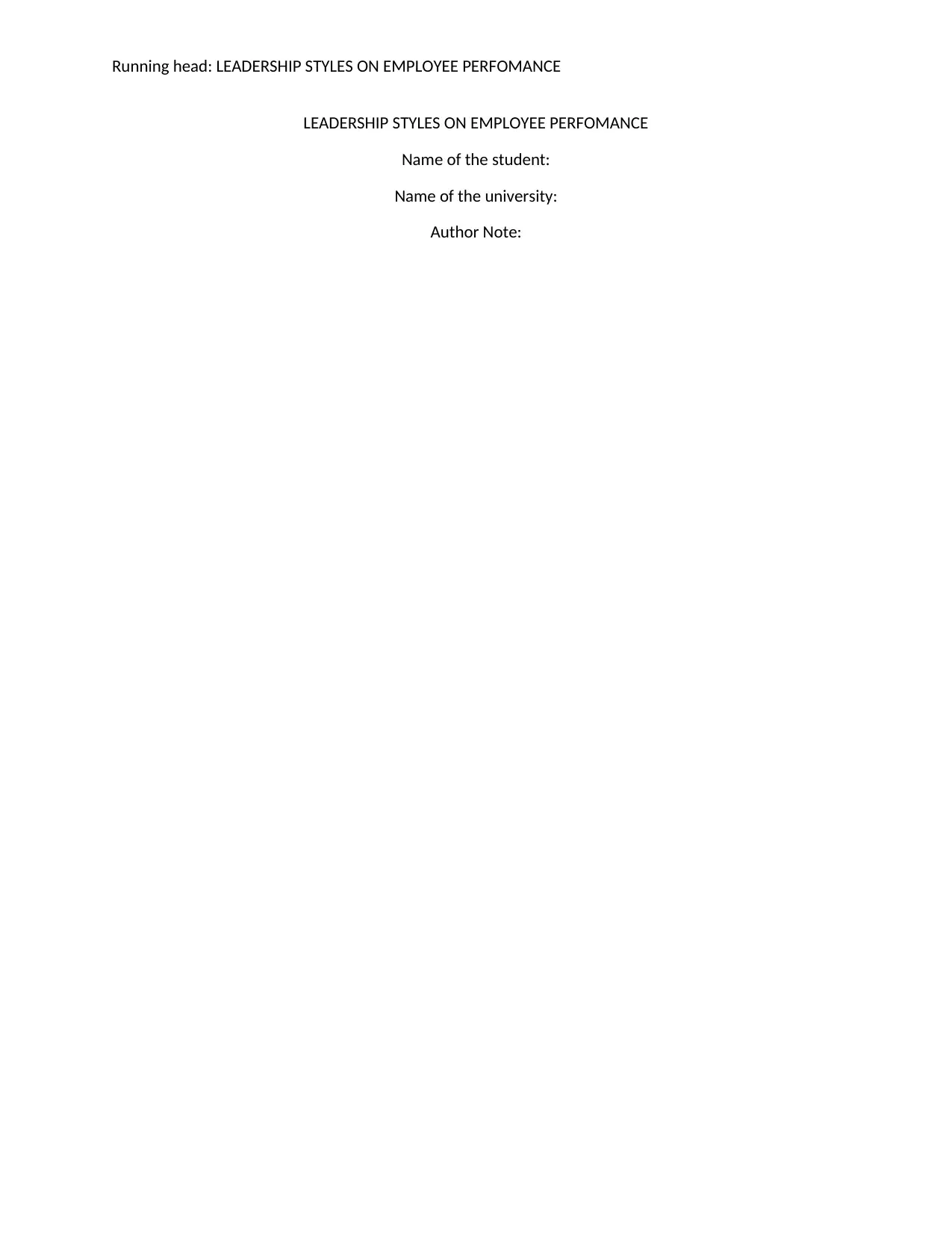
Running head: LEADERSHIP STYLES ON EMPLOYEE PERFOMANCE
LEADERSHIP STYLES ON EMPLOYEE PERFOMANCE
Name of the student:
Name of the university:
Author Note:
LEADERSHIP STYLES ON EMPLOYEE PERFOMANCE
Name of the student:
Name of the university:
Author Note:
Paraphrase This Document
Need a fresh take? Get an instant paraphrase of this document with our AI Paraphraser
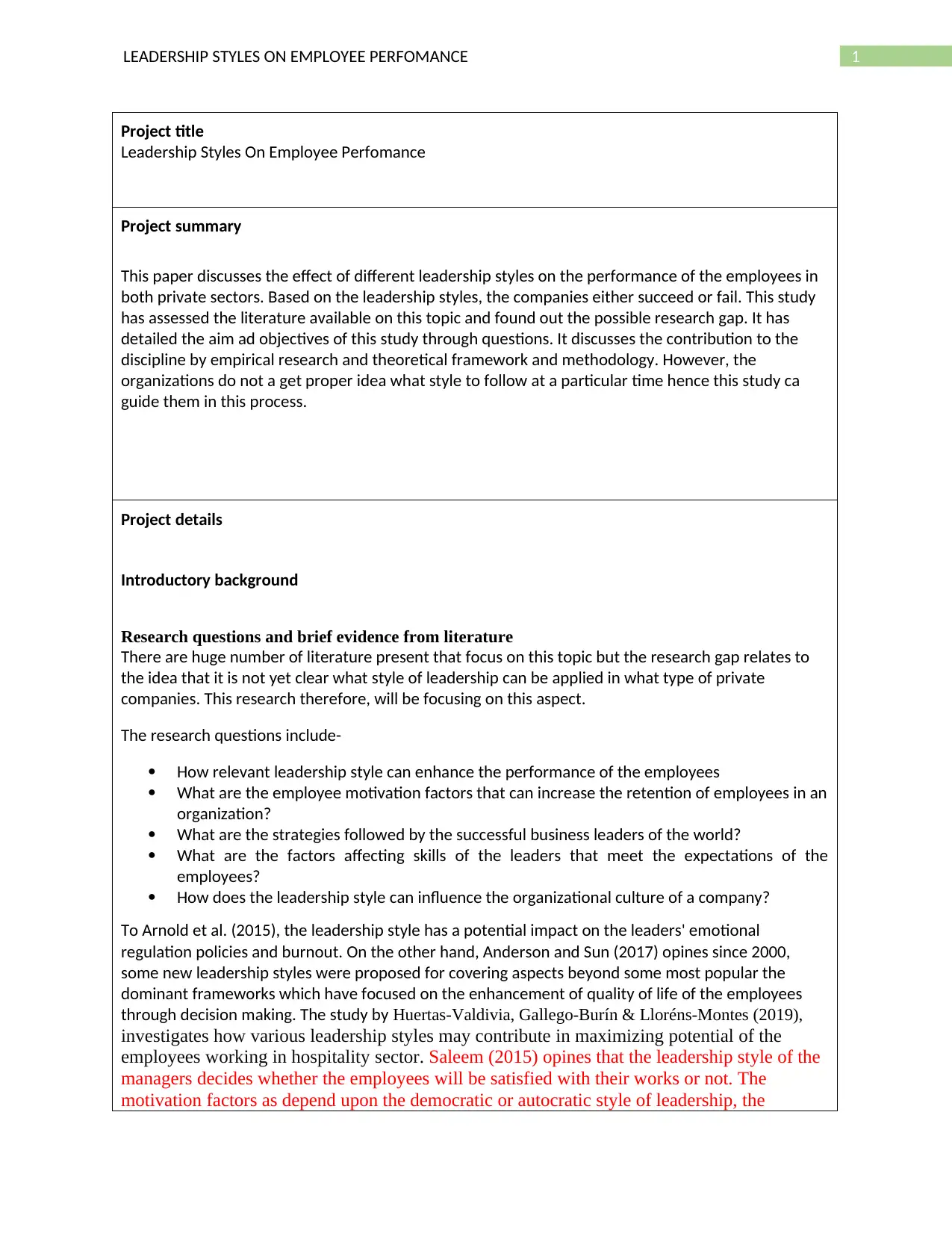
1LEADERSHIP STYLES ON EMPLOYEE PERFOMANCE
Project title
Leadership Styles On Employee Perfomance
Project summary
This paper discusses the effect of different leadership styles on the performance of the employees in
both private sectors. Based on the leadership styles, the companies either succeed or fail. This study
has assessed the literature available on this topic and found out the possible research gap. It has
detailed the aim ad objectives of this study through questions. It discusses the contribution to the
discipline by empirical research and theoretical framework and methodology. However, the
organizations do not a get proper idea what style to follow at a particular time hence this study ca
guide them in this process.
Project details
Introductory background
Research questions and brief evidence from literature
There are huge number of literature present that focus on this topic but the research gap relates to
the idea that it is not yet clear what style of leadership can be applied in what type of private
companies. This research therefore, will be focusing on this aspect.
The research questions include-
How relevant leadership style can enhance the performance of the employees
What are the employee motivation factors that can increase the retention of employees in an
organization?
What are the strategies followed by the successful business leaders of the world?
What are the factors affecting skills of the leaders that meet the expectations of the
employees?
How does the leadership style can influence the organizational culture of a company?
To Arnold et al. (2015), the leadership style has a potential impact on the leaders' emotional
regulation policies and burnout. On the other hand, Anderson and Sun (2017) opines since 2000,
some new leadership styles were proposed for covering aspects beyond some most popular the
dominant frameworks which have focused on the enhancement of quality of life of the employees
through decision making. The study by Huertas-Valdivia, Gallego-Burín & Lloréns-Montes (2019),
investigates how various leadership styles may contribute in maximizing potential of the
employees working in hospitality sector. Saleem (2015) opines that the leadership style of the
managers decides whether the employees will be satisfied with their works or not. The
motivation factors as depend upon the democratic or autocratic style of leadership, the
Project title
Leadership Styles On Employee Perfomance
Project summary
This paper discusses the effect of different leadership styles on the performance of the employees in
both private sectors. Based on the leadership styles, the companies either succeed or fail. This study
has assessed the literature available on this topic and found out the possible research gap. It has
detailed the aim ad objectives of this study through questions. It discusses the contribution to the
discipline by empirical research and theoretical framework and methodology. However, the
organizations do not a get proper idea what style to follow at a particular time hence this study ca
guide them in this process.
Project details
Introductory background
Research questions and brief evidence from literature
There are huge number of literature present that focus on this topic but the research gap relates to
the idea that it is not yet clear what style of leadership can be applied in what type of private
companies. This research therefore, will be focusing on this aspect.
The research questions include-
How relevant leadership style can enhance the performance of the employees
What are the employee motivation factors that can increase the retention of employees in an
organization?
What are the strategies followed by the successful business leaders of the world?
What are the factors affecting skills of the leaders that meet the expectations of the
employees?
How does the leadership style can influence the organizational culture of a company?
To Arnold et al. (2015), the leadership style has a potential impact on the leaders' emotional
regulation policies and burnout. On the other hand, Anderson and Sun (2017) opines since 2000,
some new leadership styles were proposed for covering aspects beyond some most popular the
dominant frameworks which have focused on the enhancement of quality of life of the employees
through decision making. The study by Huertas-Valdivia, Gallego-Burín & Lloréns-Montes (2019),
investigates how various leadership styles may contribute in maximizing potential of the
employees working in hospitality sector. Saleem (2015) opines that the leadership style of the
managers decides whether the employees will be satisfied with their works or not. The
motivation factors as depend upon the democratic or autocratic style of leadership, the
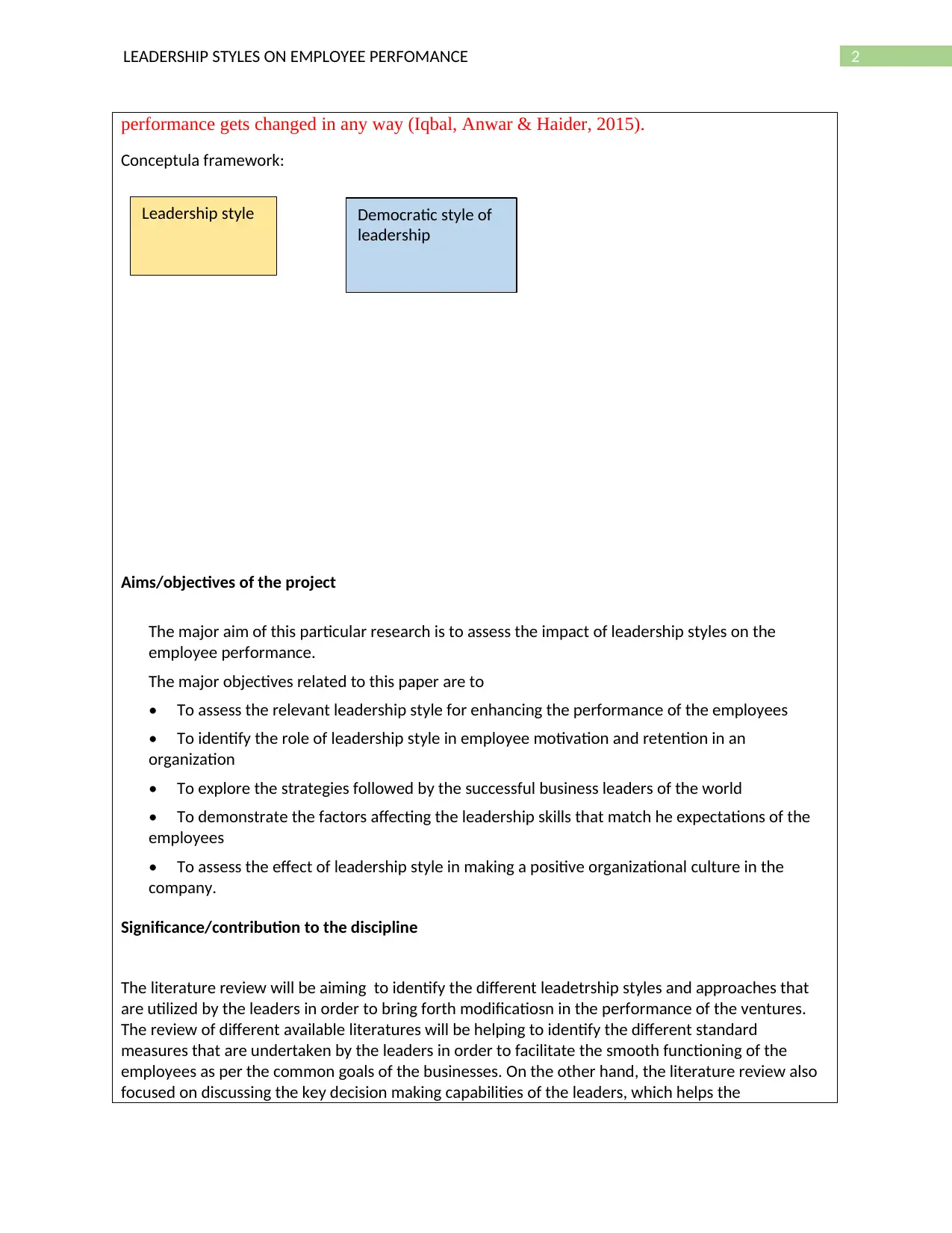
2LEADERSHIP STYLES ON EMPLOYEE PERFOMANCE
performance gets changed in any way (Iqbal, Anwar & Haider, 2015).
Conceptula framework:
Aims/objectives of the project
The major aim of this particular research is to assess the impact of leadership styles on the
employee performance.
The major objectives related to this paper are to
• To assess the relevant leadership style for enhancing the performance of the employees
• To identify the role of leadership style in employee motivation and retention in an
organization
• To explore the strategies followed by the successful business leaders of the world
• To demonstrate the factors affecting the leadership skills that match he expectations of the
employees
• To assess the effect of leadership style in making a positive organizational culture in the
company.
Significance/contribution to the discipline
The literature review will be aiming to identify the different leadetrship styles and approaches that
are utilized by the leaders in order to bring forth modificatiosn in the performance of the ventures.
The review of different available literatures will be helping to identify the different standard
measures that are undertaken by the leaders in order to facilitate the smooth functioning of the
employees as per the common goals of the businesses. On the other hand, the literature review also
focused on discussing the key decision making capabilities of the leaders, which helps the
Leadership style Democratic style of
leadership
performance gets changed in any way (Iqbal, Anwar & Haider, 2015).
Conceptula framework:
Aims/objectives of the project
The major aim of this particular research is to assess the impact of leadership styles on the
employee performance.
The major objectives related to this paper are to
• To assess the relevant leadership style for enhancing the performance of the employees
• To identify the role of leadership style in employee motivation and retention in an
organization
• To explore the strategies followed by the successful business leaders of the world
• To demonstrate the factors affecting the leadership skills that match he expectations of the
employees
• To assess the effect of leadership style in making a positive organizational culture in the
company.
Significance/contribution to the discipline
The literature review will be aiming to identify the different leadetrship styles and approaches that
are utilized by the leaders in order to bring forth modificatiosn in the performance of the ventures.
The review of different available literatures will be helping to identify the different standard
measures that are undertaken by the leaders in order to facilitate the smooth functioning of the
employees as per the common goals of the businesses. On the other hand, the literature review also
focused on discussing the key decision making capabilities of the leaders, which helps the
Leadership style Democratic style of
leadership
⊘ This is a preview!⊘
Do you want full access?
Subscribe today to unlock all pages.

Trusted by 1+ million students worldwide
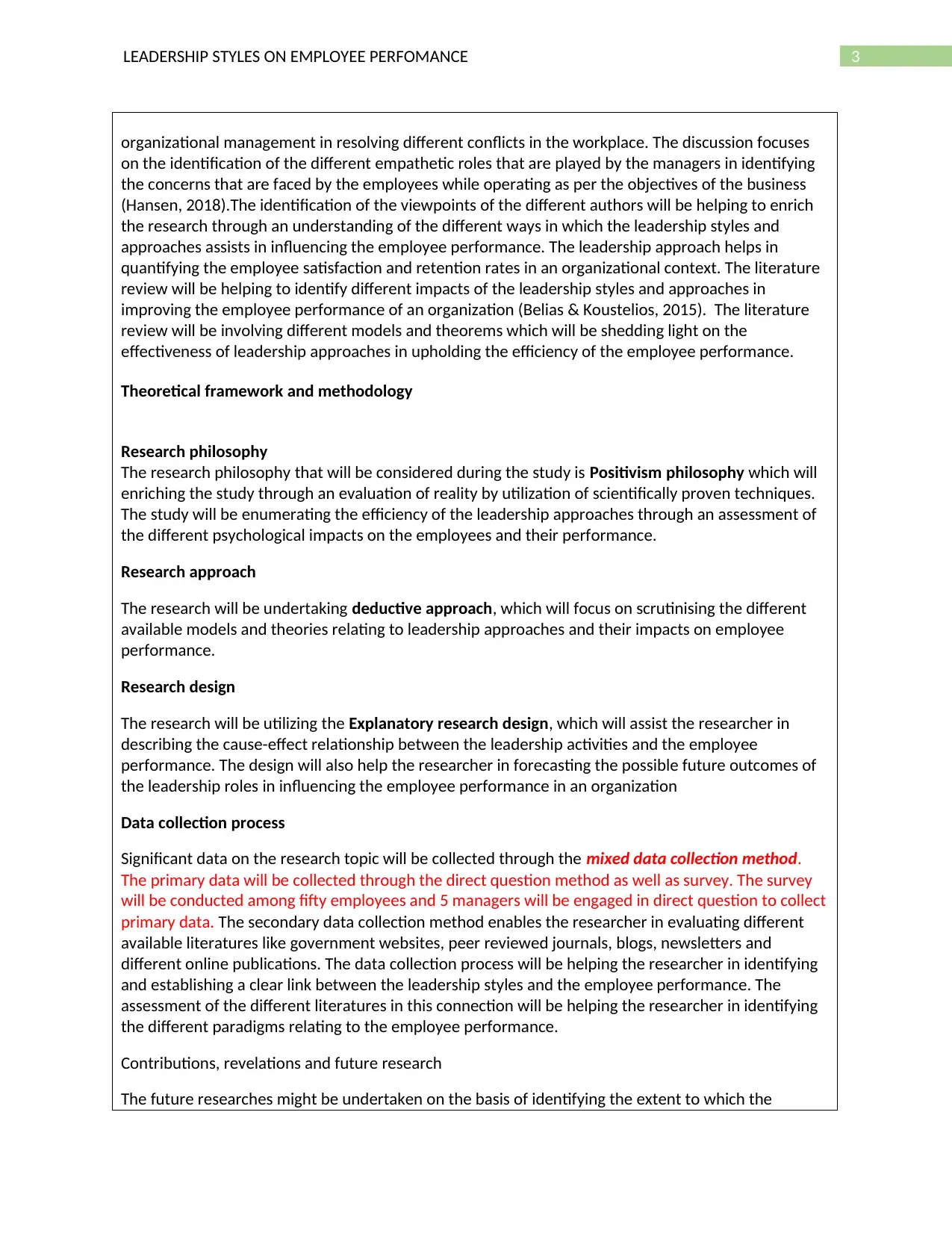
3LEADERSHIP STYLES ON EMPLOYEE PERFOMANCE
organizational management in resolving different conflicts in the workplace. The discussion focuses
on the identification of the different empathetic roles that are played by the managers in identifying
the concerns that are faced by the employees while operating as per the objectives of the business
(Hansen, 2018).The identification of the viewpoints of the different authors will be helping to enrich
the research through an understanding of the different ways in which the leadership styles and
approaches assists in influencing the employee performance. The leadership approach helps in
quantifying the employee satisfaction and retention rates in an organizational context. The literature
review will be helping to identify different impacts of the leadership styles and approaches in
improving the employee performance of an organization (Belias & Koustelios, 2015). The literature
review will be involving different models and theorems which will be shedding light on the
effectiveness of leadership approaches in upholding the efficiency of the employee performance.
Theoretical framework and methodology
Research philosophy
The research philosophy that will be considered during the study is Positivism philosophy which will
enriching the study through an evaluation of reality by utilization of scientifically proven techniques.
The study will be enumerating the efficiency of the leadership approaches through an assessment of
the different psychological impacts on the employees and their performance.
Research approach
The research will be undertaking deductive approach, which will focus on scrutinising the different
available models and theories relating to leadership approaches and their impacts on employee
performance.
Research design
The research will be utilizing the Explanatory research design, which will assist the researcher in
describing the cause-effect relationship between the leadership activities and the employee
performance. The design will also help the researcher in forecasting the possible future outcomes of
the leadership roles in influencing the employee performance in an organization
Data collection process
Significant data on the research topic will be collected through the mixed data collection method.
The primary data will be collected through the direct question method as well as survey. The survey
will be conducted among fifty employees and 5 managers will be engaged in direct question to collect
primary data. The secondary data collection method enables the researcher in evaluating different
available literatures like government websites, peer reviewed journals, blogs, newsletters and
different online publications. The data collection process will be helping the researcher in identifying
and establishing a clear link between the leadership styles and the employee performance. The
assessment of the different literatures in this connection will be helping the researcher in identifying
the different paradigms relating to the employee performance.
Contributions, revelations and future research
The future researches might be undertaken on the basis of identifying the extent to which the
organizational management in resolving different conflicts in the workplace. The discussion focuses
on the identification of the different empathetic roles that are played by the managers in identifying
the concerns that are faced by the employees while operating as per the objectives of the business
(Hansen, 2018).The identification of the viewpoints of the different authors will be helping to enrich
the research through an understanding of the different ways in which the leadership styles and
approaches assists in influencing the employee performance. The leadership approach helps in
quantifying the employee satisfaction and retention rates in an organizational context. The literature
review will be helping to identify different impacts of the leadership styles and approaches in
improving the employee performance of an organization (Belias & Koustelios, 2015). The literature
review will be involving different models and theorems which will be shedding light on the
effectiveness of leadership approaches in upholding the efficiency of the employee performance.
Theoretical framework and methodology
Research philosophy
The research philosophy that will be considered during the study is Positivism philosophy which will
enriching the study through an evaluation of reality by utilization of scientifically proven techniques.
The study will be enumerating the efficiency of the leadership approaches through an assessment of
the different psychological impacts on the employees and their performance.
Research approach
The research will be undertaking deductive approach, which will focus on scrutinising the different
available models and theories relating to leadership approaches and their impacts on employee
performance.
Research design
The research will be utilizing the Explanatory research design, which will assist the researcher in
describing the cause-effect relationship between the leadership activities and the employee
performance. The design will also help the researcher in forecasting the possible future outcomes of
the leadership roles in influencing the employee performance in an organization
Data collection process
Significant data on the research topic will be collected through the mixed data collection method.
The primary data will be collected through the direct question method as well as survey. The survey
will be conducted among fifty employees and 5 managers will be engaged in direct question to collect
primary data. The secondary data collection method enables the researcher in evaluating different
available literatures like government websites, peer reviewed journals, blogs, newsletters and
different online publications. The data collection process will be helping the researcher in identifying
and establishing a clear link between the leadership styles and the employee performance. The
assessment of the different literatures in this connection will be helping the researcher in identifying
the different paradigms relating to the employee performance.
Contributions, revelations and future research
The future researches might be undertaken on the basis of identifying the extent to which the
Paraphrase This Document
Need a fresh take? Get an instant paraphrase of this document with our AI Paraphraser
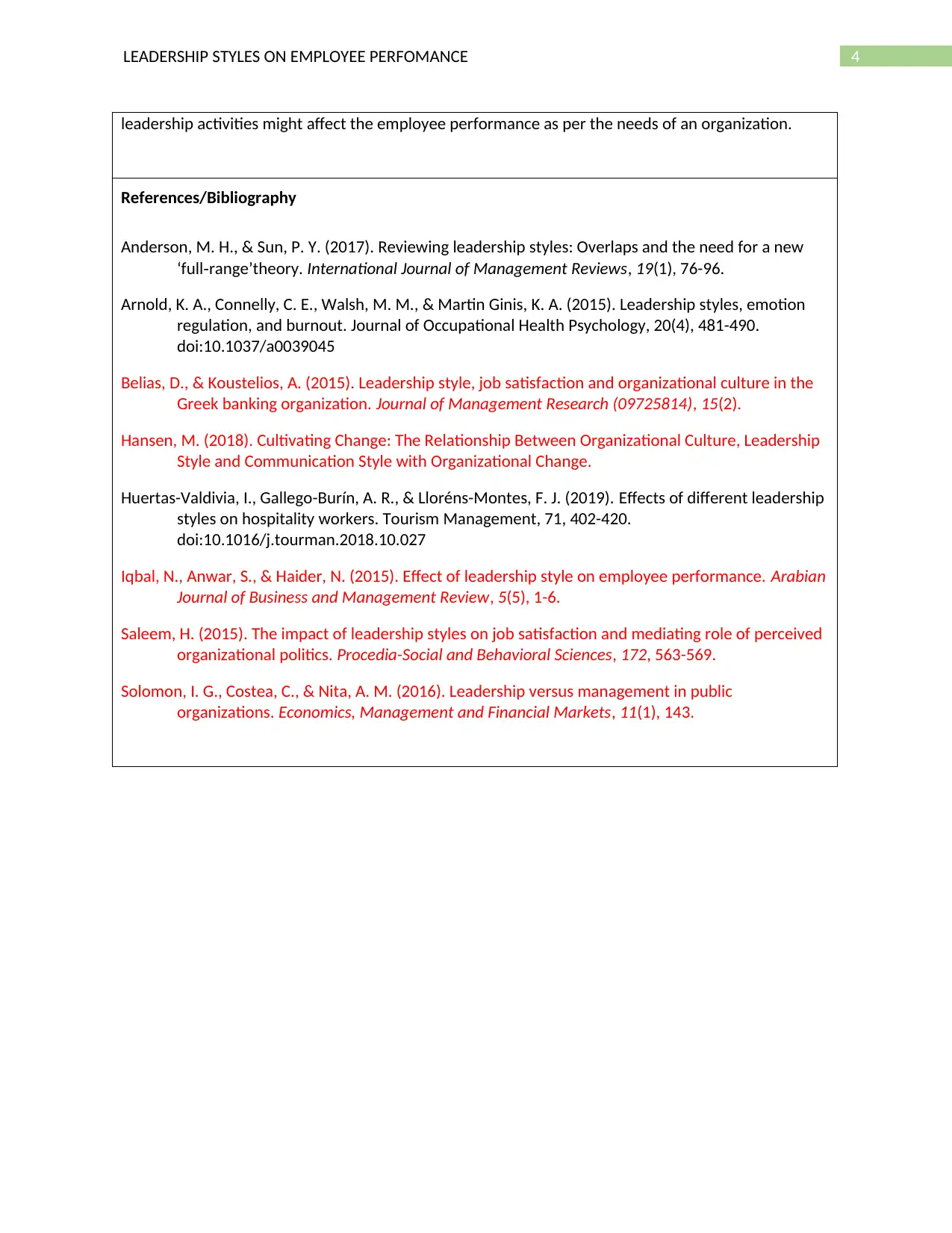
4LEADERSHIP STYLES ON EMPLOYEE PERFOMANCE
leadership activities might affect the employee performance as per the needs of an organization.
References/Bibliography
Anderson, M. H., & Sun, P. Y. (2017). Reviewing leadership styles: Overlaps and the need for a new
‘full‐range’theory. International Journal of Management Reviews, 19(1), 76-96.
Arnold, K. A., Connelly, C. E., Walsh, M. M., & Martin Ginis, K. A. (2015). Leadership styles, emotion
regulation, and burnout. Journal of Occupational Health Psychology, 20(4), 481-490.
doi:10.1037/a0039045
Belias, D., & Koustelios, A. (2015). Leadership style, job satisfaction and organizational culture in the
Greek banking organization. Journal of Management Research (09725814), 15(2).
Hansen, M. (2018). Cultivating Change: The Relationship Between Organizational Culture, Leadership
Style and Communication Style with Organizational Change.
Huertas-Valdivia, I., Gallego-Burín, A. R., & Lloréns-Montes, F. J. (2019). Effects of different leadership
styles on hospitality workers. Tourism Management, 71, 402-420.
doi:10.1016/j.tourman.2018.10.027
Iqbal, N., Anwar, S., & Haider, N. (2015). Effect of leadership style on employee performance. Arabian
Journal of Business and Management Review, 5(5), 1-6.
Saleem, H. (2015). The impact of leadership styles on job satisfaction and mediating role of perceived
organizational politics. Procedia-Social and Behavioral Sciences, 172, 563-569.
Solomon, I. G., Costea, C., & Nita, A. M. (2016). Leadership versus management in public
organizations. Economics, Management and Financial Markets, 11(1), 143.
leadership activities might affect the employee performance as per the needs of an organization.
References/Bibliography
Anderson, M. H., & Sun, P. Y. (2017). Reviewing leadership styles: Overlaps and the need for a new
‘full‐range’theory. International Journal of Management Reviews, 19(1), 76-96.
Arnold, K. A., Connelly, C. E., Walsh, M. M., & Martin Ginis, K. A. (2015). Leadership styles, emotion
regulation, and burnout. Journal of Occupational Health Psychology, 20(4), 481-490.
doi:10.1037/a0039045
Belias, D., & Koustelios, A. (2015). Leadership style, job satisfaction and organizational culture in the
Greek banking organization. Journal of Management Research (09725814), 15(2).
Hansen, M. (2018). Cultivating Change: The Relationship Between Organizational Culture, Leadership
Style and Communication Style with Organizational Change.
Huertas-Valdivia, I., Gallego-Burín, A. R., & Lloréns-Montes, F. J. (2019). Effects of different leadership
styles on hospitality workers. Tourism Management, 71, 402-420.
doi:10.1016/j.tourman.2018.10.027
Iqbal, N., Anwar, S., & Haider, N. (2015). Effect of leadership style on employee performance. Arabian
Journal of Business and Management Review, 5(5), 1-6.
Saleem, H. (2015). The impact of leadership styles on job satisfaction and mediating role of perceived
organizational politics. Procedia-Social and Behavioral Sciences, 172, 563-569.
Solomon, I. G., Costea, C., & Nita, A. M. (2016). Leadership versus management in public
organizations. Economics, Management and Financial Markets, 11(1), 143.
1 out of 5
Related Documents
Your All-in-One AI-Powered Toolkit for Academic Success.
+13062052269
info@desklib.com
Available 24*7 on WhatsApp / Email
![[object Object]](/_next/static/media/star-bottom.7253800d.svg)
Unlock your academic potential
Copyright © 2020–2025 A2Z Services. All Rights Reserved. Developed and managed by ZUCOL.





